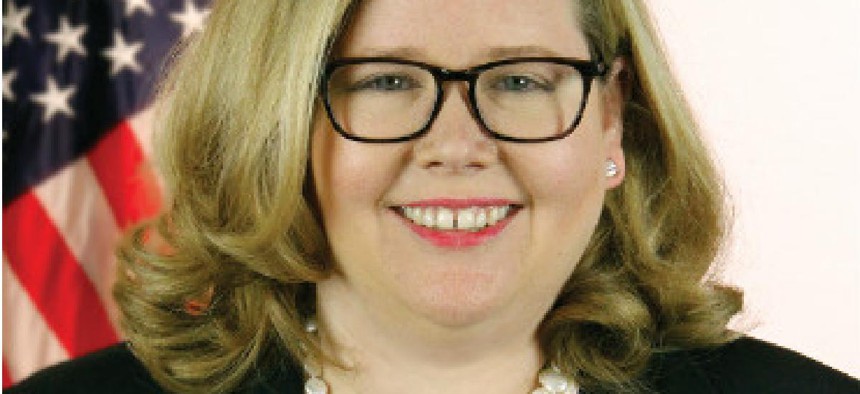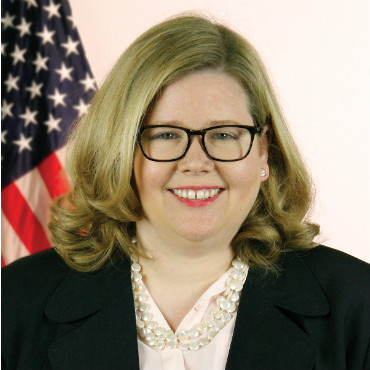Lawmakers hear from Trump's picks to lead GSA, OPM

Federal hiring, the clearance backlog and procurement data came up in a Senate confirmation hearing for candidates to lead the Office of Personnel Management and the General Services Administration.

Emily Murphy, President Trump's pick to lead the General Services Administration, told a Senate panel that federal procurement data systems have room for improvement.
Information technology, cybersecurity and workforce reform were the main focuses of a relatively smooth Senate confirmation hearing for President Donald Trump's picks to lead the Office of Personnel Management and the General Services Administration.
In September, Trump nominated Jeff Pon and Emily Murphy to serve as director of OPM and administrator of GSA, respectively. Trump's original pick to head OPM, George Nesterczuk, withdrew from consideration in July after failing to secure a confirmation hearing. In June, Trump picked Michael Rigas for OPM's deputy director slot.
The three posts are key to government operations, specializing in workforce issues, procurement policy, IT policy and other governmentwide management responsibilities amid the administration's planned governmental reorganization, which emphasizes civilian-side budget cuts, trimming the workforce and leaning more on the private sector.
Testifying before the Senate Homeland Security and Government Affairs Committee Oct. 18, Pon said he hoped to reform the federal hiring and training processes by improving IT and making the process simpler overall.
He testified that he'd like to reduce the average hiring time from its current 100 days to under three months.
"We have not taken a hard look at our civil service laws in decades," he said. "We are still relying on paper processes, and in too many areas, the federal government is not a workplace keeping up with the demands of the next generation of public servants, or serving our current federal employees."
Pon, who helped roll out the USAJobs.gov website in his first stint at OPM under George W. Bush, said improving hiring efficiency was "of utmost importance." In addition to educating agencies on their hiring authorities, he advocated eliminating unused hiring authorities, providing self-service menus for managers complete with position descriptions, investing in employee training, and moving to "applicant tracking systems that are much more automated."
As OPM continues to recover from the 2015 data breach that exposed personal information from some 20 million personnel records, Rigas stressed the agency's need to "restore the confidence of the public in the agency's ability to safeguard federal employee data."
Another IT challenge OPM faces is its massive backlog of security clearance applicants.
The National Background Investigations Bureau, which has a backlog of more than 700,000 applications and plans to transition to a DOD-built system, "seems as though it's stabilizing the investigations process, yet still we need to make substantial results in whittling down the backlog," he said.
In regards to potentially moving NBIB out from under OPM control, he added, "I have read Acting Director [Kathleen] McGettigan's concerns about moving it anywhere, including DOD, and proper planning is required currently for looking at whether or not it's feasible."
On the GSA side, Murphy laid out her management priorities, including the reduction of duplication of systems and unused real estate, increasing competition at the contract award and task order levels, as well as improving agency transparency.
Murphy proposed providing the public access to the federal real property databased, making more data available on Data.gov, as well as improving the "integration and usability" of the System for Award Management/Integrated Award Environment.
"GSA can and should improve the quality, security and accessibility of its data, while helping other agencies do the same," she said.
If confirmed, Murphy will take over an agency that handles over $50 billion in procurement annually.
An issue that some speculated could lead to Murphy taking some political heat during her hearing is the agency's lease for the Trump International Hotel, which specifies the lessee cannot hold public office while on the lease. While a GSA contracting officer had earlier ruled that there were no conflicts or other issues arising from the president's lease, congressmen and ethics watchdogs have expressed concerns in the past over how Trump might benefit from it.
No senators asked Murphy about the lease at the hearing.


